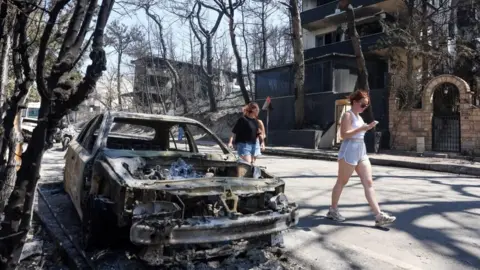### A State of Emergency in Southern Europe Due to Wildfires
As the summer heat intensifies, southern Europe is grappling with wildfires that are wreaking havoc across several countries, prompting evacuations and alarming health warnings. An unprecedented heatwave has pushed temperatures soaring above 40°C (104°F), exacerbating the devastating conditions for many regions.
In nations such as Italy, France, Spain, Portugal, and parts of the Balkans, red heat alerts have been issued, indicating a significant risk to public health. Specifically, Spain’s weather service, Aemet, has predicted temperatures could spike to 44°C (111.2°F) in cities like Seville and Cordoba, while southern Portugal is expected to witness similar extremes.
### Human Toll and Health Risks
The dire situation has already resulted in casualties. In Spain, an employee at an equestrian center tragically passed away from severe burns in Tres Cantos, located near Madrid. The rapidly changing weather, featuring winds exceeding 70 km/h (43 mph), has fueled wildfires that encroach upon residential areas, necessitating mass evacuations. Hundreds of residents have been forced to flee their homes to escape the advancing flames.
Authorities are emphasizing caution; Spanish Prime Minister Pedro Sanchez issued statements recently, imploring citizens to remain vigilant about the fire risks as emergency services work around the clock to contain the raging infernos. In the northwestern region of Castile and Leon, nearly 4,000 individuals were evacuated as more than 30 wildfires erupted, including one threatening the UNESCO-listed site of Las Médulas, famous for its ancient gold mines.
### Escalating Crisis in Portugal and Other Nearby Nations
The neighboring country of Portugal is not immune from the crisis either, as firefighters battle multiple large wildfires, particularly one near Trancoso. Rescue operations are underway, with significant resources deployed to combat the flames. Over 1,300 firefighters, along with 14 aircraft, are actively engaged in firefighting efforts, aided by two planes from Morocco after several Portuguese water bombers malfunctioned.
The Italian landscape is experiencing similar tribulations. Reports have confirmed a heatstroke-related death of a child, with the nation bracing for record temperatures in cities like Rome, Milan, and Florence. The authorities declared red heat alerts in 16 cities due to extreme weather conditions this week. One particularly tragic incident involved a young Romanian boy, who became unconscious in a vehicle in Sardinia; despite being airlifted to a hospital in Rome, he later succumbed to irreversible brain damage caused by heatstroke.
### Other Affected Areas and Global Warning
France is also facing the repercussions of this heatwave. Almost three-quarters of the nation is under heat alerts, with predictions of temperatures surpassing 36°C in Paris, while the Rhône Valley expects to experience peaks of 40°C. French Health Minister Catherine Vautrin expressed concerns regarding the healthcare system’s preparedness for the second heatwave in just weeks.
Greece is seeing rampant wildfires as well, with more than 100 fires igniting due to strong winds. Significant evacuations are in progress on the tourist destination of Zakynthos and in western Achaia, where numerous homes and businesses have been lost to the flames. The Turkish government has declared victories over several major fires, particularly in regions such as Canakkale and Izmir, but thousands remain at risk as the situation evolves.
In addition, regions within Montenegro and Albania have suffered from raging wildfires, with Montenegrin forces facing casualties during firefighting missions, reflecting the dire circumstances engulfing southeast Europe.
Scientists have warned that global warming is leading to hotter, drier Mediterranean summers, which significantly contribute to longer and more severe fire seasons. Authorities continue to monitor the situation closely, urging governments and citizens alike to remain vigilant under these extreme conditions.
As the battle against these devastating wildfires continues, the situation remains precarious for many living in southern Europe, underscoring the urgent need for climate action and resilience planning to mitigate future disasters.











